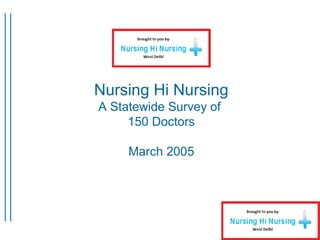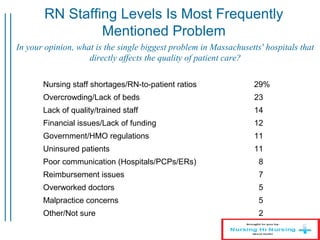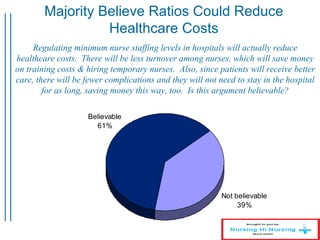Surve
- 1. Nursing Hi Nursing A Statewide Survey of 150 Doctors March 2005
- 2. RN Staffing Levels Is Most Frequently Mentioned Problem In your opinion, what is the single biggest problem in Massachusetts' hospitals that directly affects the quality of patient care? Nursing staff shortages/RN-to-patient ratios 29% Overcrowding/Lack of beds 23 Lack of quality/trained staff 14 Financial issues/Lack of funding 12 Government/HMO regulations 11 Uninsured patients 11 Poor communication (Hospitals/PCPs/ERs) 8 Reimbursement issues 7 Overworked doctors 5 Malpractice concerns 5 Other/Not sure 2
- 3. Much too high 1% About right 17% A little too low 56% A little too high 5% Much too low 21% Over 3/4ths of Doctors Think RN Staffing Levels Are Too Low Thinking about the staffing levels of registered nurses in Massachusetts hospitals, on average, would you say that RN staffing levels at most hospitals are too high, too low, or about right?
- 4. Not sure 1% Somewhat disagree 14% Somewhat agree 29% Strongly disagree 3% Strongly agree 53% Strong Agreement that Quality is Suffering Some people say that the quality of patient care in Massachusetts hospitals is suffering because there are not enough registered nurses working in the hospitals and patients have to share their nurse with too many other patients. Do you agree or disagree with this statement?
- 5. Doctors See Wide Range of Problems Resulting From Low RN Staffing Are you aware of any instances in MA where an RN's patient load has led to that outcome. 19% 29% 37% 43% 54% 61% 82% 84%Patients having to wait long periods of time for medication and procedures Nurses not having enough time to comfort/assist patients and families Medical errors, such as improper medication or dosages Complications or other problems for a patient Longer hospital stays for patients Injury or harm to patients Readmission of a patient Mortality for patients % Yes
- 6. Nearly 3/4ths Favor Minimum Ratios The MA legislature is considering a bill that would require hospitals to adequately staff acute care facilities and limit the number of patients RNs could care for at one time by setting minimum registered nurse-to-patient ratios. These ratios would vary by unit—in an ICU the ratio would be 1 nurse to 2 patients; in Medical/Surgery units the ratio would be 1-to-4. Would you favor or oppose the legislature passing such a bill? Not sure 4% Somewhat oppose 10% Somewhat favor 31% Strongly oppose 12% Strongly favor 43%
- 7. Nearly 3/4ths Think Minimum Ratios Would Improve Care of Their Patients Not sure 6% No 22% Yes 72% Do you think establishing a minimum registered nurse-to-patient ratio would improve the care of the patients you see?
- 8. Most Doctors Think Ratios Would Improve Quality of Healthcare in Massachusetts Worse 11% Same 23% Not sure 6% Better 60% If this proposed law passes, do you think the quality of healthcare in MA will get better, worse, or stay they same as it is now?
- 9. Majority Believe Ratios Could Reduce Healthcare Costs Not believable 39% Believable 61% Regulating minimum nurse staffing levels in hospitals will actually reduce healthcare costs. There will be less turnover among nurses, which will save money on training costs & hiring temporary nurses. Also, since patients will receive better care, there will be fewer complications and they will not need to stay in the hospital for as long, saving money this way, too. Is this argument believable?
- 10. Majority Believe Ratios Could Reduce Healthcare Costs Not believable 39% Believable 61% Regulating minimum nurse staffing levels in hospitals will actually reduce healthcare costs. There will be less turnover among nurses, which will save money on training costs & hiring temporary nurses. Also, since patients will receive better care, there will be fewer complications and they will not need to stay in the hospital for as long, saving money this way, too. Is this argument believable?









